Fin mai, La Face B a rencontré Demob Happy, trio de Newcastle, qui finit sa tournée européenne. En fait, nous nous croisons généralement tous les ans depuis 2021 au Festival de Reading & Leeds mais cette fois-ci, c’est en plein cœur de Bordeaux que nous nous retrouvons et réalisons cette interview ! Nous avons profité du beau soleil de printemps pour discuter de la tournée, des projets de Demob Happy, l’évolution musicale du groupe et de Divine machines. Après l’interview, nous marchons avec les trois Geordies dans le quartier de Barbey pour plus de photos et de fous rires.
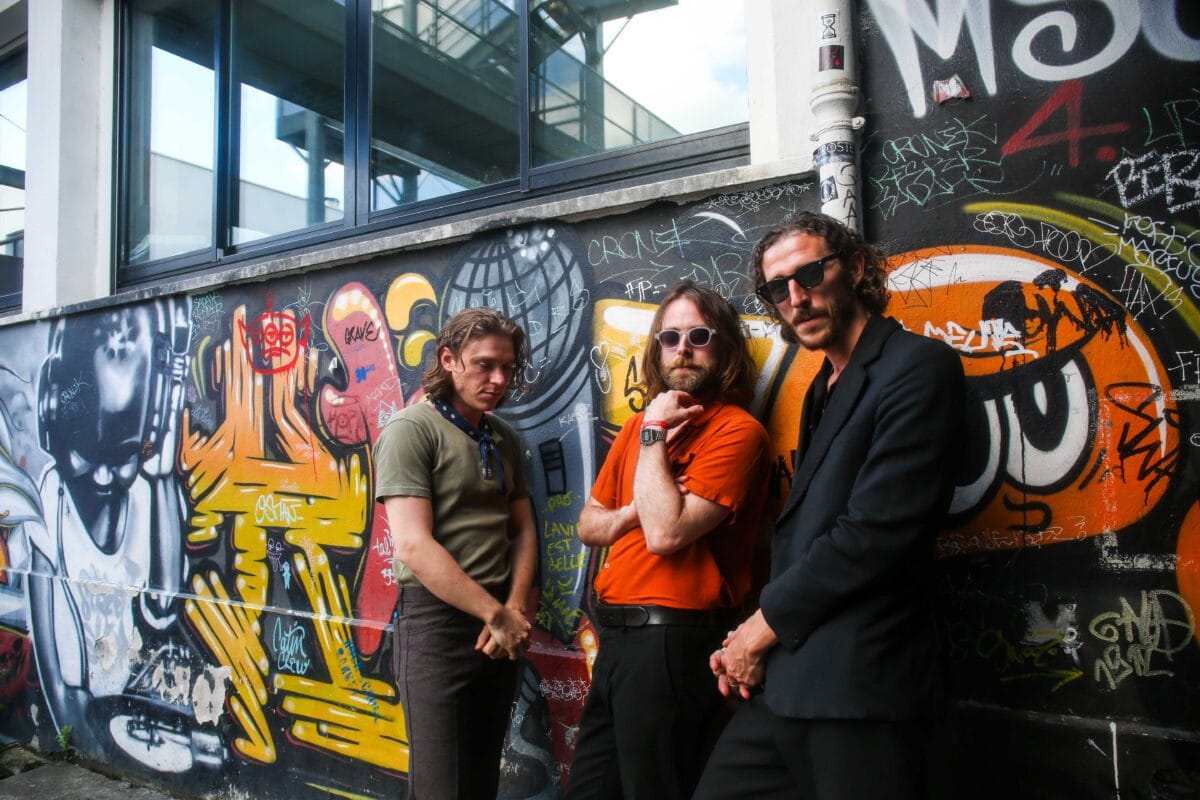
Retrouvez également le travail d‘Alexia Arrizabalaga-Burns (sous le pseudo Troubleshooteur) sur son site et sur Instagram
La Face B : Bonjour Demob Happy ! La tournée est presque terminée. Il ne vous reste plus qu’une date. Comment ça s’est passé ?
Matthew Marcantonio : Ça a été super ! Ça a été incroyable ! Tout d’abord, nous avons fait deux dates en Hollande, puis cinq en France, et nous avons été vraiment surpris. Chaque concert a été incroyable. Nous avons vraiment l’impression de tourner depuis longtemps, par contre nous n’avons jamais rien fait de manière régulière aux Pays-Bas ou en France.
Cela donne une impression de constance et les gens commencent vraiment à réagir. Notre groupe grandit de manière vraiment cool. Les gens connaissent les chansons et les concerts se vendent bien. C’est vraiment incroyable.
Thomas Armstrong : Aussi, nous ne regardons pas trop les tickets, alors c’est agréable de monter sur scène et de se dire « wow, vous êtes venus ! »
« La musique évolue et change avec nous et nos goûts, avec ce que nous nous sentons inspirés à créer. Je pense que l’aspect de mélodie et d’harmonie est quelque chose vers lequel nous revenons toujours. »
Thomas Armstrong, Demob Happy
La Face B : Une chose dont nous avons discuté avec Fraulein (1ere partie): c’est que les Français sont beaucoup plus interactifs lorsque les groupes étrangers jouent. Ils diront « ça va » si un imprévu se passe. Personne n’est là pour vous piéger ou avec de mauvaises intentions. C’est un sentiment assez agréable. Les gens sont assez enthousiastes lorsque des groupes britanniques jouent ici.
Thomas Armstrong : Ils semblent également soutenir les premières parties. Ils semblent vouloir qu’elles réussissent. Ensuite, ils se déchaînent vraiment quand nous montons sur scène, ce qu’il faut faire.
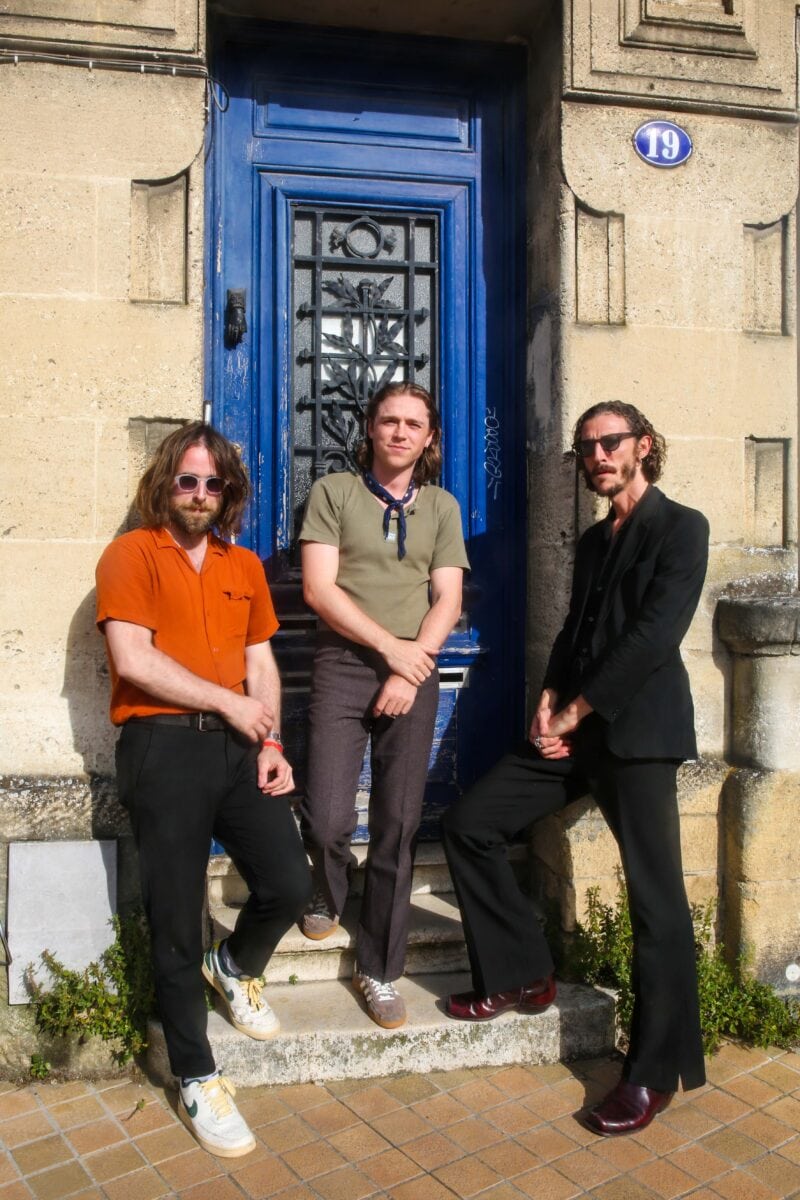
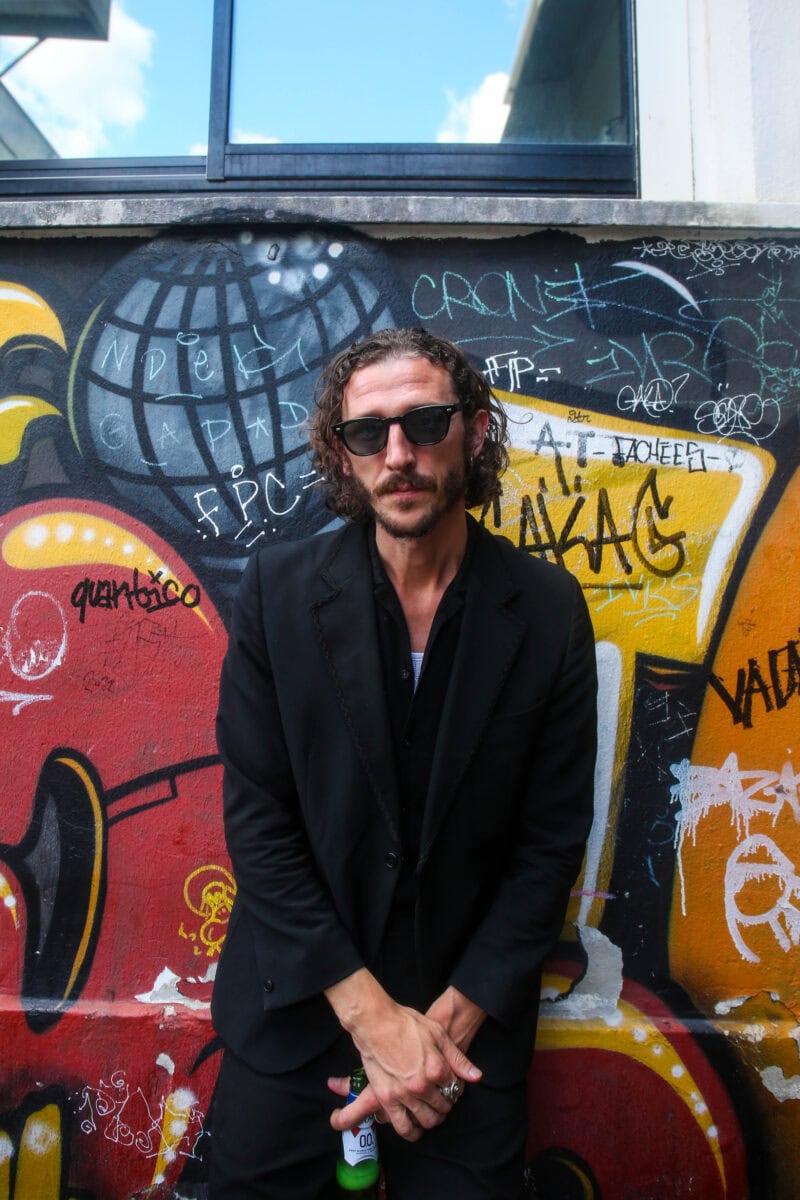
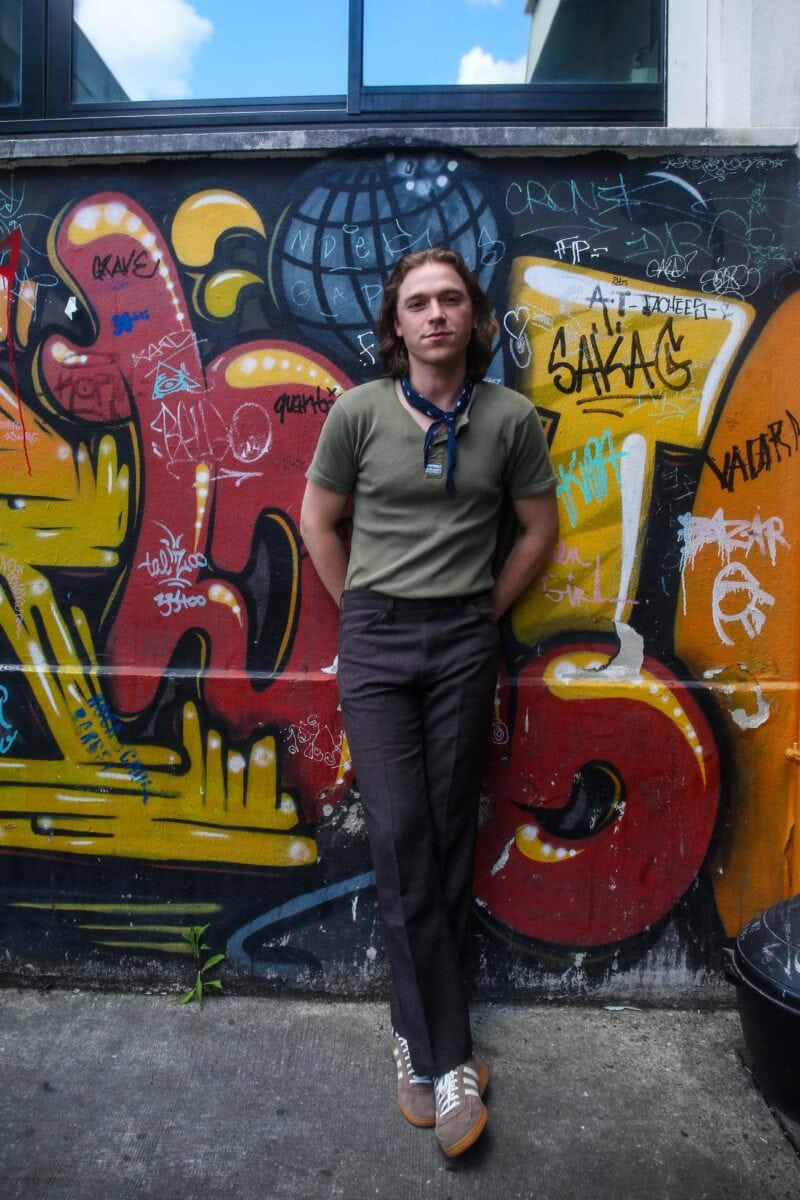
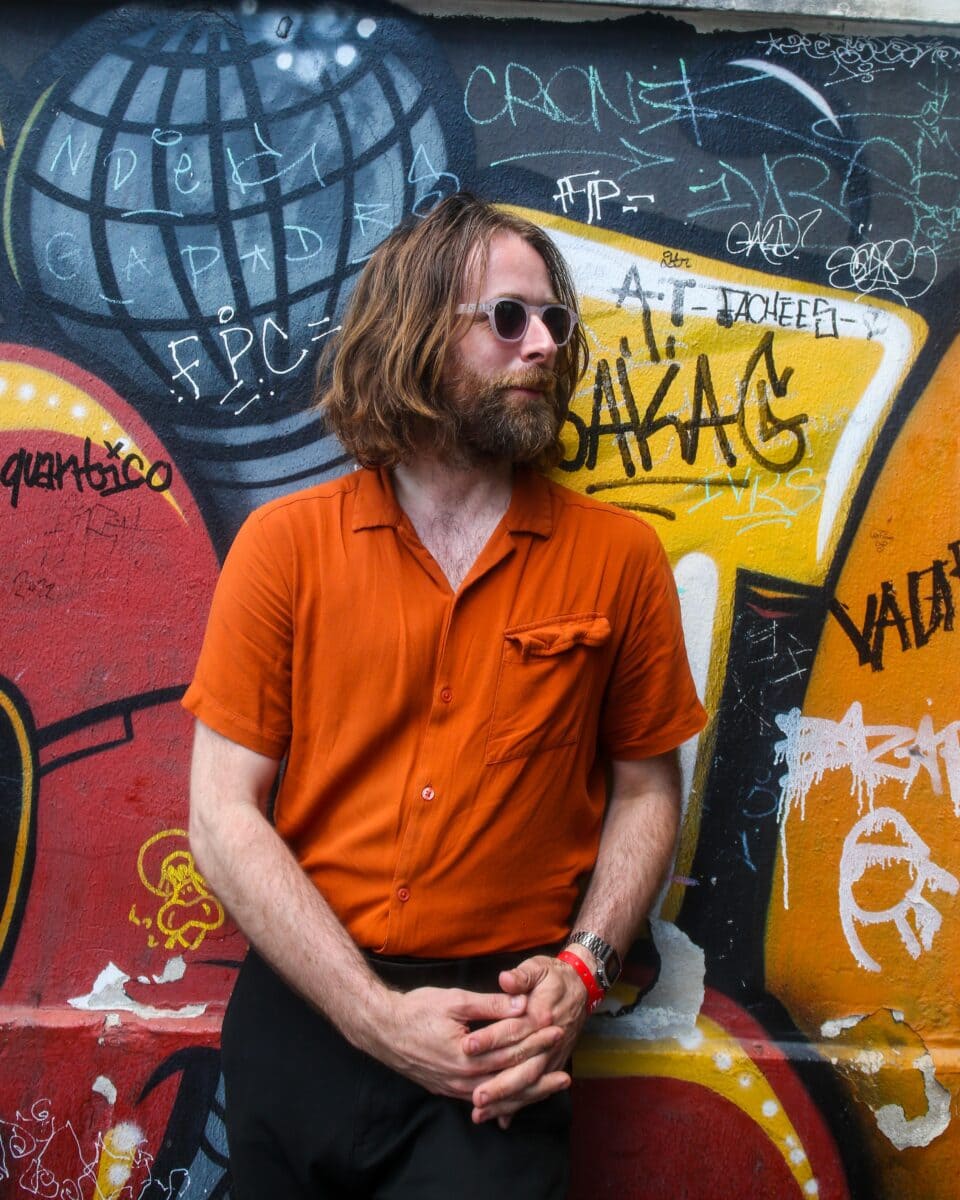
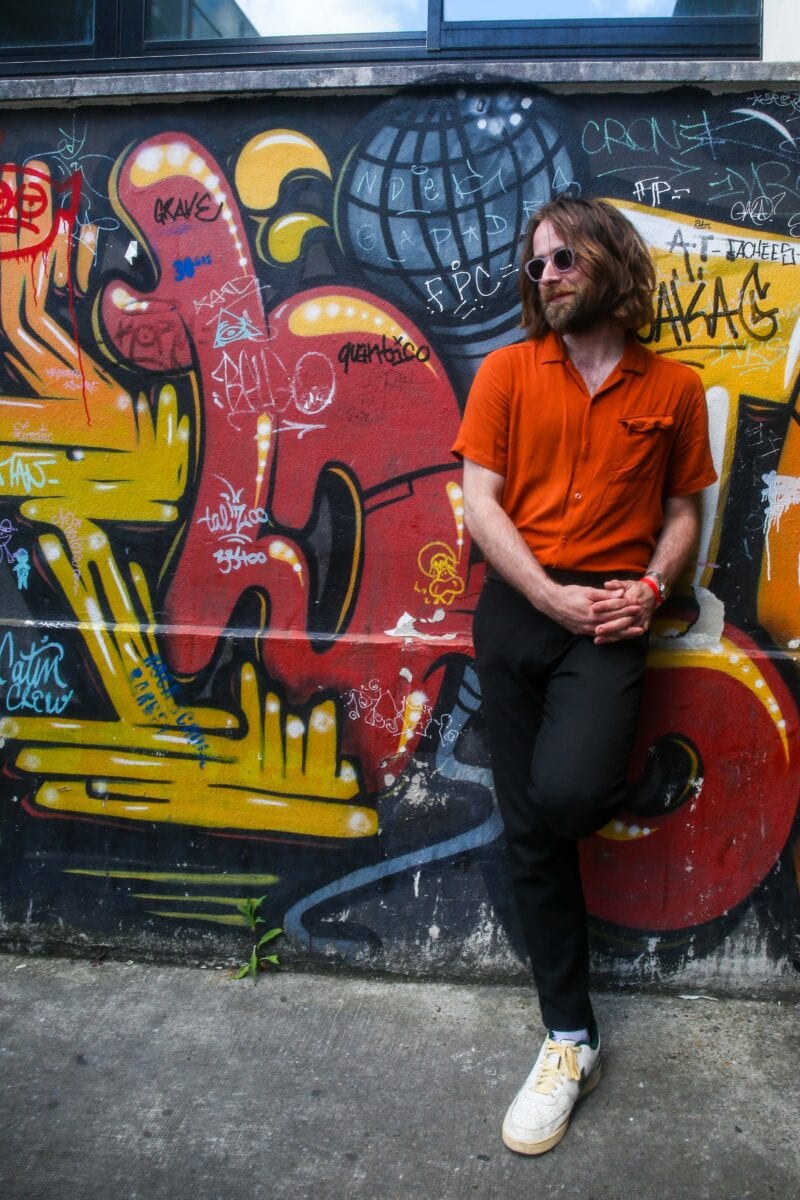
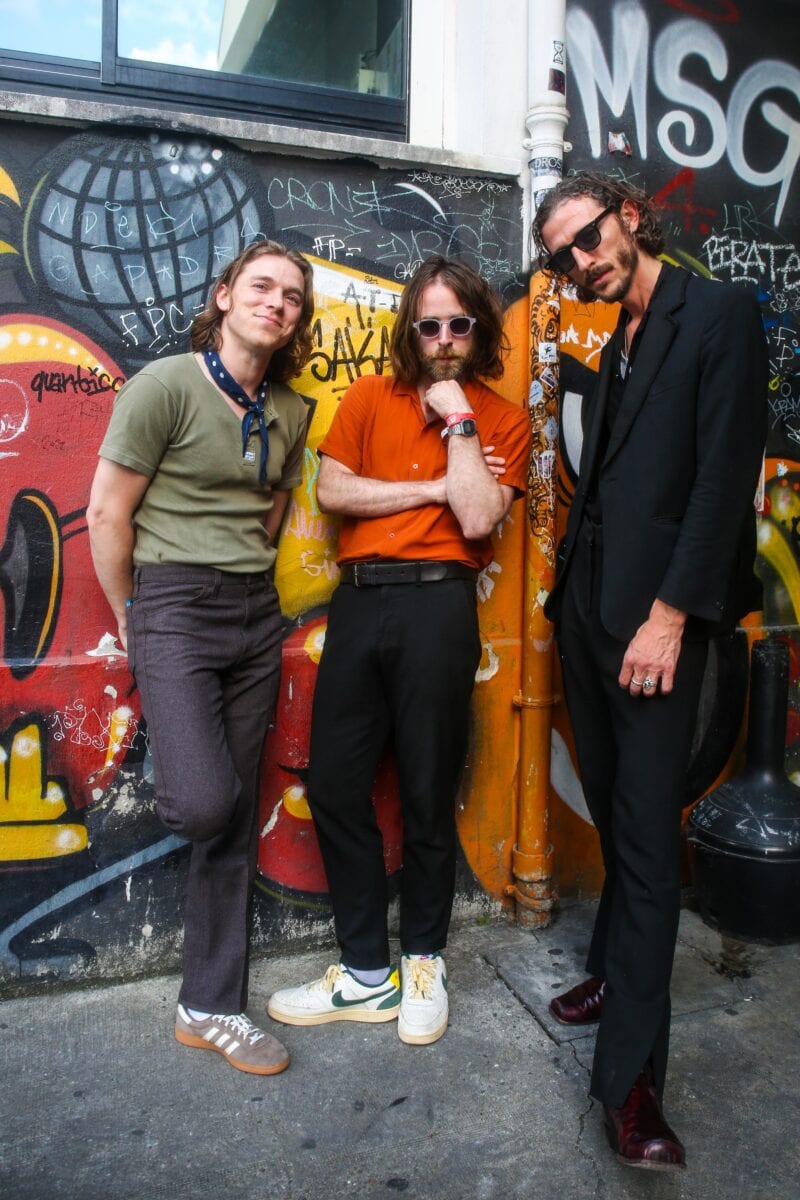
La Face B : Très belle transition ! Je sais que vous avez commencé en première partie de Jack White, Royal Blood ou Frank Carter.
Matthew Marcantonio : Parmi tant d’autres.
La Face B : Je sais ! Alors, qu’avez-vous appris d’eux ?
Matthew Marcantonio : Rien. Absolument rien. En fait, c’est nous qui leur avons appris quelques trucs. Ils ont reçu une éducation de notre part.
La Face B : Comment le fait d’ouvrir pour ces groupes vous a-t-il impactés ?
Matthew Marcantonio : Je plaisante !
La Face B : Je le sais – je le vois à ton sourire après deux secondes.
Matthew Marcantonio : Nous avons beaucoup appris d’eux. Je pense que Frank Carter and The Rattlesnakes a été la première vraie tournée que nous avons faite. Un groupe vraiment établi et nous avons appris beaucoup sur comment être un vrai groupe en tournée.
Adam Godfrey : C’était jour après jour et nous ne l’avions jamais vraiment fait avant. Nous avions fait des concerts avant mais jamais devant ces foules, et nous devions monter en énergie chaque soir et nous préparer un peu plus.
Thomas Armstrong : Je pense que ce n’est pas vraiment ce que tu apprends, mais tu captes des astuces de tournée comme parler du matériel avec les gens et c’est un peu différent de faire les premières parties par rapport aux concerts en tête d’affiche. C’est très différent. Quand c’est ton concert, tout le monde est là, ils connaissent les chansons et ils t’attendent. Quand tu es en première partie, tu essaies de conquérir une salle entière de gens qui ne t’ont jamais entendu. Cela demande une énergie différente mais c’est génial quand ça marche.
La Face B : Vous avez aussi la responsabilité de maintenir l’énergie pour la tête d’affiche et vous découvrez un tout nouveau public, ce qui est génial. Vous pouvez montrer votre son et qui est Demob Happy.
Thomas Armstrong : Et voler des fans.
Matthew Marcantonio : Et voler des fans.
La Face B : Je ne pense pas que ce soit voler des fans. C’est une question de se faire découvrir, de la même manière que lorsque vous jouez dans des festivals et que les gens découvrent des groupes tout le temps.
Adam Godfrey : Nous avons beaucoup de gens qui viennent à nos concerts en tête d’affiche que nous avons rattrapés en cours de route et « volés » lors de ces premières parties.
Thomas Armstrong : Partager peut-être.
Matthew Marcantonio : Partager ou peut-être débaucher.
La Face B : Donc vous êtes un trio de Newcastle ou de Brighton de ces jours-ci? Je suis un peu confuse !
Matthew Marcantonio : Newcastle !!!
Thomas Armstrong : Newcastle, ouais !
Adam Godfrey : Ouais, Newcastle.
La Face B : Merci Demob Happy!
Thomas Armstrong : Newcastle, nés, grandis puis partis.
La Face B : Partis à Brighton. Donc toujours pas déménagé à Londres, toujours à Brighton.
Matthew Marcantonio : Probablement jamais Londres.
Thomas Armstrong : À moins de devenir ridiculement riches et peut-être Londres comme une troisième maison à Londres. Je ne veux pas être pauvre à Londres.
La Face B : C’est un peu nul oui. Alors, qu’est-ce qui vous manque du Nord en vivant à Brighton ?
Matthew Marcantonio : Eh bien, tu vis dans le Nord (à Thomas).
Thomas Armstrong : J’ai déménagé chez moi. Alors ces gars peuvent venir me rendre visite.
Matthew Marcantonio : Nous (avec Adam) pensons tous les deux à retourner à Newcastle bientôt de toute façon.
La Face B : Vraiment ?
Matthew Marcantonio : Notre saga à Brighton pourrait toucher à sa fin.
La Face B : Pourquoi ?
Matthew Marcantonio : Parce que nous y vivons depuis quatorze ans !
Thomas Armstrong : C’est moins cher, nous avons de la famille là-bas et c’est vraiment une période excitante à Newcastle avec beaucoup de bonne nourriture, de la bonne musique.
La Face B : Je trouve que le Nord de l’Angleterre est très dynamique. J’aime le Nord, la créativité, l’état d’esprit. Les gens sont sympas. Ils sont plus directs et honnêtes.
Adam Godfrey : Nous sommes trois Geordies (personnes de Newcastle) honnêtes.
La Face B : Comme Sting.
Thomas Armstrong : L’honnêteté n’est pas appréciée.
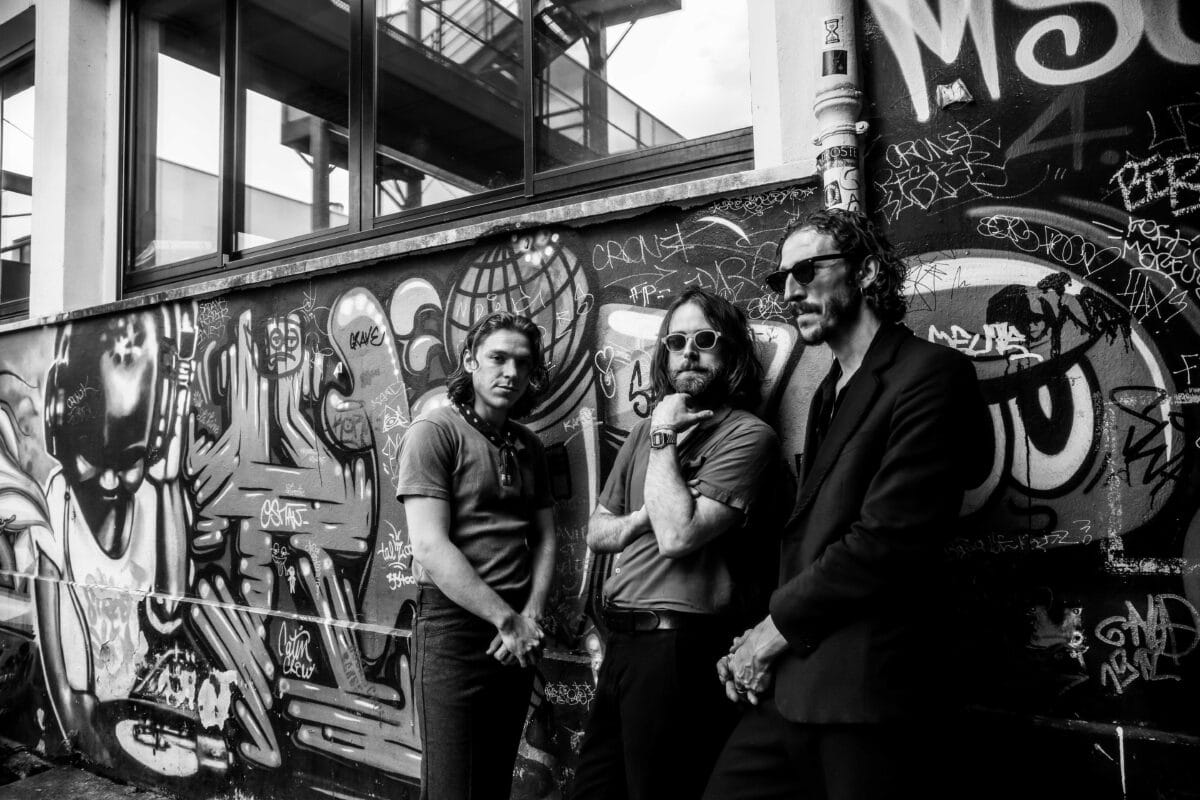
La Face B : Parlons de l’évolution de votre identité musicale ! J’ai beaucoup écouté Be Your Man et les harmonies riches. Je n’aime pas faire de comparaisons, mais j’ai vu des gens sur YouTube écrire « On dirait les Beatles. »
Matthew Marcantonio : Ce n’est pas une mauvaise chose.
La Face B : Je sais, n’est-ce pas ? Mais certaines personnes n’aiment pas les comparaisons parce qu’elles essaient de créer leur propre son. Mais sur votre premier album, les harmonies vocales sont très riches, nostalgiques de l’ère des Beatles, des Beach Boys.
Avec Divine Machines, votre son est plus percutant. C’est comme si le premier album était axé sur les harmonies vocales et les albums suivants sur les rythmes instrumentaux.
Matthew Marcantonio : C’est vrai.
La Face B : Parlez-moi davantage de l’évolution de votre identité musicale avec Demob Happy !
Matthew Marcantonio : Je n’y ai jamais pensé en ces termes. Je pense qu’il y a moins d’harmonies.
La Face B : Be Your Man est un morceau très esthétique en termes de construction des voix, des tonalités. Ça fonctionne et c’est très esthétique.
Thomas Armstrong : Je ne pense pas que ce soit quelque chose dont nous nous éloignerons complètement. L’axe a changé et, évidemment, la musique évolue et change avec nous et nos goûts, avec ce que nous nous sentons inspirés à créer. Je pense que l’aspect de mélodie et d’harmonie est quelque chose vers lequel nous revenons toujours. Peut-être que c’est moins célébré sur Divine Machines, mais il y a une sensation luxuriante et un groove que nous avons voulu exploré.
Adam Godfrey : Cela est influencé par la création de Divine Machines parce que tu (Matt) t’es vraiment impliqué dans l’ajout de synthés et de layers. Nous n’étions pas ensemble pour l’écrire autant que nous l’étions au départ, mais beaucoup de sons synthés ont commencé à se développer.
La Face B : Vous avez beaucoup de richesse. Dans le premier album, cela se trouvait dans la diversité vocale, dans les autres albums, cela se trouve dans les rythmes comme le groove et les instruments.
Matthew Marcantonio : C’est juste.
La Face B : Qu’est-ce qui vous a inspiré pour chaque album ? Ou est-ce simplement la vie qui a suivi son cours ?
Thomas Armstrong : Le premier album était presque comme le meilleur des six ou sept premières années du groupe. Nous avons choisi nos chansons préférées que nous avions déjà au fil des ans sur des EPs et des petites choses. Et nous sommes aussi partis de là pour en faire un album, y ajouter de nouvelles choses et peut-être que le dernier a été fait dans un laps de temps plus serré et le premier avec de grands écarts. Tout est organique.
La Face B : Comment écrivez-vous vos chansons ? Vous écrivez à six mains ? Avez-vous des techniques ou des processus de composition ? Commencez-vous par les paroles ou la mélodie ?
Matthew Marcantonio : C’est un peu un spectre. Cela dépend vraiment de chaque chanson. Je finis toujours par écrire la mélodie et les paroles. Les paroles sont toujours en dernier. En toute fin.
Thomas Armstrong : À la dernière minute.
Matthew Marcantonio : Je trouve toujours que pour les paroles, nous écrivons la mélodie et nous avons une idée des sons phonétiques, puis une fois la chanson en place, c’est très informé par le nombre de mots dans un vers et ce que le son de la mélodie doit faire pour traduire le sentiment du moment. Il m’arrive parfois d’écrire les paroles d’abord et de les intégrer ensuite dans une chanson, mais c’est normalement toujours la mélodie d’abord et les harmonies ensuite, avec des morceaux ici et là. Donc j’ai besoin de quelques paroles ici et de quelques paroles là.
Thomas Armstrong : Ensuite, nous approfondissons le sens de la chanson. Qu’est-ce que cela signifie pour correspondre à comment elle doit sonner ?
Matthew Marcantonio : Il y a toujours une idée initiale ou des paroles que j’improviserai probablement pour la plupart, puis je me demande ce que je voulais dire et j’élabore dessus. Quand il s’agit de finir les paroles, c’est normalement ainsi que ça se passe. Cela peut être très amusant de le faire de cette manière, mais aussi vraiment épuisant parfois, car il faut retrouver le sentiment initial des paroles.
Adam Godfrey : Ce qui est tellement subconscient au départ.
Matthew Marcantonio : Exactement, et j’essaie d’écrire autant de paroles que possible lorsque je suis inspiré sur le moment. C’est très la première idée, car cela a le plus de sens.
La Face B : C’est là que la magie opère quand ce n’est pas trop calculé.
Thomas Armstrong : On pense toujours qu’on peut écrire un refrain et un couplet et revenir plus tard pour les compléter. Mais en réalité, ce n’est souvent pas si simple.
La Face B : Cela n’a jamais évolué au fil des années ? Les processus créatifs peuvent changer, même si les gens développent des habitudes très rapidement. Pour vous, c’est toujours la mélodie d’abord, puis les paroles.
Matthew Marcantonio : Je pense que oui, car j’ai toujours été tellement axé sur la mélodie et en tant que groupe, nous aimons les mélodies. Beaucoup de mes artistes préférés ont également écrit de cette manière. Comme McCartney, Lennon, ils trouvaient toujours les mélodies en premier. J’ai toujours trouvé que si l’on est lié à une forme lyrique, cela informe alors la mélodie, mais en réalité, la mélodie doit être libre de faire ce qu’elle doit faire.
La Face B : C’est plus contraignant si vous avez d’abord les paroles, car vous devez adapter la musique aux paroles, aux sons des voyelles et à la fin de chaque couplet.
Matthew Marcantonio : Oui, et parfois ça peut être un peu maladroit.
La Face B : L’inverse est plus fluide, tu écoutes quelque chose et tu improvises dessus.
Matthew Marcantonio : Oui, et les paroles font ce qu’elles ont à faire.
La Face B : Matthew, tu composes principalement ou est-ce un exercice auquel vous êtes tous les trois impliqués ?
Thomas Armstrong : C’est un peu un mélange en fait. La plupart des chansons de Demob Happy viennent de deux camps principalement. Soit Matt a une idée et une chanson qui arrive. Parfois, c’est complètement formé, parfois presque formé, et en groupe, nous construisons autour et nous répondons à cette idée, ajoutant la batterie ou souvent ça sort d’un jam que nous avons eu. Parfois pendant les balances, ou quand nous partons écrire ensemble.
Un riff ou quelque chose. Ou nous prenons quelque chose du pot à jam, c’est une grande liste de tous les riffs cools que nous avons enregistrés et des trucs que nous avons captés à divers moments. Parfois, quand nous sommes ensemble, nous sortons quelque chose et nous nous disons « qu’est-ce que ça va être ? » Nous travaillons ensemble jusqu’à en faire une chanson. Normalement, c’est un de ces camps.
Matthew Marcantonio : C’est vraiment deux camps. Prenons Be Your Man : C’était basé sur un riff et un refrain que j’avais, et je pense que j’avais le middle eight mélodique. J’ai apporté ça aux gars puis le construire jusqu’à ce que ce soit ce que c’est. Et la guitare que nous avons ajoutée. Si j’écris seul, j’aime être seul et en ma propre compagnie parce que je vais sortir mille idées et essayer un million de choses pour voir ce qui fonctionne, ce qui ne fonctionne pas, essayer tous ces accords jusqu’à ce que je sois satisfait de quelque chose.
Ensuite, quand nous faisons de la jam, c’est quelque chose de très différent, cela devient des émotions et des sentiments très différents. C’est toujours très différent parce que si nous faisons une jam avec un riff cool ou quelque chose, c’est une sensation différente pour moi de prendre ça et d’écrire une mélodie et des paroles dessus. C’est réactif plutôt que proactif.
Thomas Armstrong : Je pourrais jouer un groove et Matt ajouterait une ligne de basse ou l’inverse. Et nous avons ce processus de rebondir sur des trucs. Nous nous dirigeons souvent vers quelque chose qui nous fait rire parce que ça sonne juste fou ou autre. Nos processus tombent dans ces camps. Ils sont différents.
Et aussi, quand tu écris des paroles, surtout, il y a des moments où nous disons des trucs pendant ces sessions de jam, nous enregistrons souvent ces sessions de toute façon, donc il pourrait y avoir des bouts de mélodie si tu te sens inspiré ou des phrases autour desquelles nous pouvons construire. Pour les paroles, il est souvent bon d’avoir des portes fermées et de voir ce que ça signifie pour toi. Mais pas trop, ce que les gens dans la pièce vont chanter. C’est tuer le truc, c’est trop tôt.
La Face B : Quand vous écrivez des chansons, certaines personnes sont très diligentes, d’autres ne réfléchissent pas trop, mais quand votre chanson est là, c’est aux gens de ressentir ce qu’ils ressentent.
Thomas Armstrong : Tu passes les clés.
Adam Godfrey : Tu ne peux pas gérer ça.
La Face B : Tu peux y mettre tellement de choses et puis cela aura un sens totalement différent pour quelqu’un d’autre.
Adam Godfrey : La seule fois où on y pense, c’est du point de vue dynamique, comme comment rendre ça plus fort. C’est la partie à laquelle nous pensons « Eh bien, est-ce que ça va déchirer ? » Mais c’est plutôt une décision tardive.
Thomas Armstrong : C’est un autre chapeau de penser à la façon dont la chanson se traduit parce que tu as l’émotion là-dedans et le craft jusqu’à un certain point, puis tu dois mettre un chapeau et te demander comment ça va affecter les gens, tu mixes et tu essaies de créer une montée et une chute, et tout ça.
La Face B : Pour avoir une réaction. C’est super important comment les gens chantent en chœur. Des groupes comme Queen font des refrains faits pour encourager les gens à chanter, applaudir, et c’est la vibe que tu veux donner à ta chanson, pas le sens. Quand c’est dehors, ça ne t’appartient plus. Alors, après cette tournée, qu’est-ce qui se passe ?
Thomas Armstrong : Je ne pense pas que nous ayons annoncé quoi que ce soit. Il y a des trucs.
Matthew Marcantonio : Il y a des choses qui se passent ici et là. Nous sommes sur le point d’annoncer un concert en Hollande, à Utrecht. Il y a un festival en Allemagne, un en Belgique, donc nous faisons des bricoles.
La Face B : Un nouvel album pour Demob Happy?
Matthew Marcantonio : Nous allons travailler sur un nouveau disque, en gros.
La Face B : La tournée a-t-elle inspiré de nouveaux morceaux ?
Matthew Marcantonio : Pas encore.
Thomas Armstrong : Nous avons écrit une chanson pendant les répétitions alors que nous aurions dû être en train de répéter. C’était assez génial. On a adoré, ça nous a fait rire.
Matthew Marcantonio : On dirait que nous allons travailler là-dessus vers la fin de l’année.
La Face B : Merci beaucoup Demob Happy. Je vous souhaite un super concert ce soir à Barbey et à Lille.
Demob Happy : Merci !
De plus, suivez Demob Happy en live ou sur Instagram
Toujours plus d’interviews et de photos de concerts dans La Face B
Enfin, retrouvez les articles d‘Alexia Arrizabalaga-Burns dans La Face B
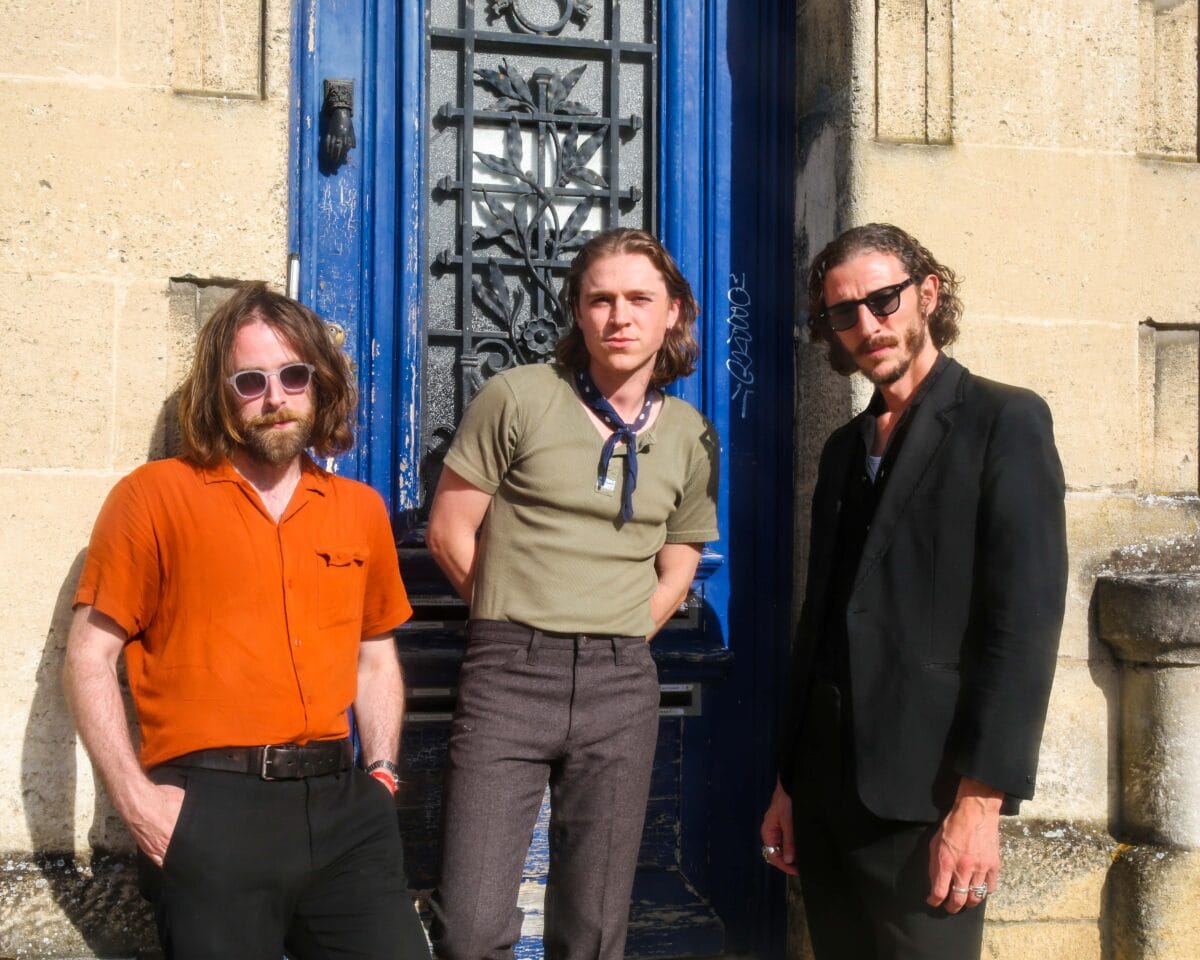
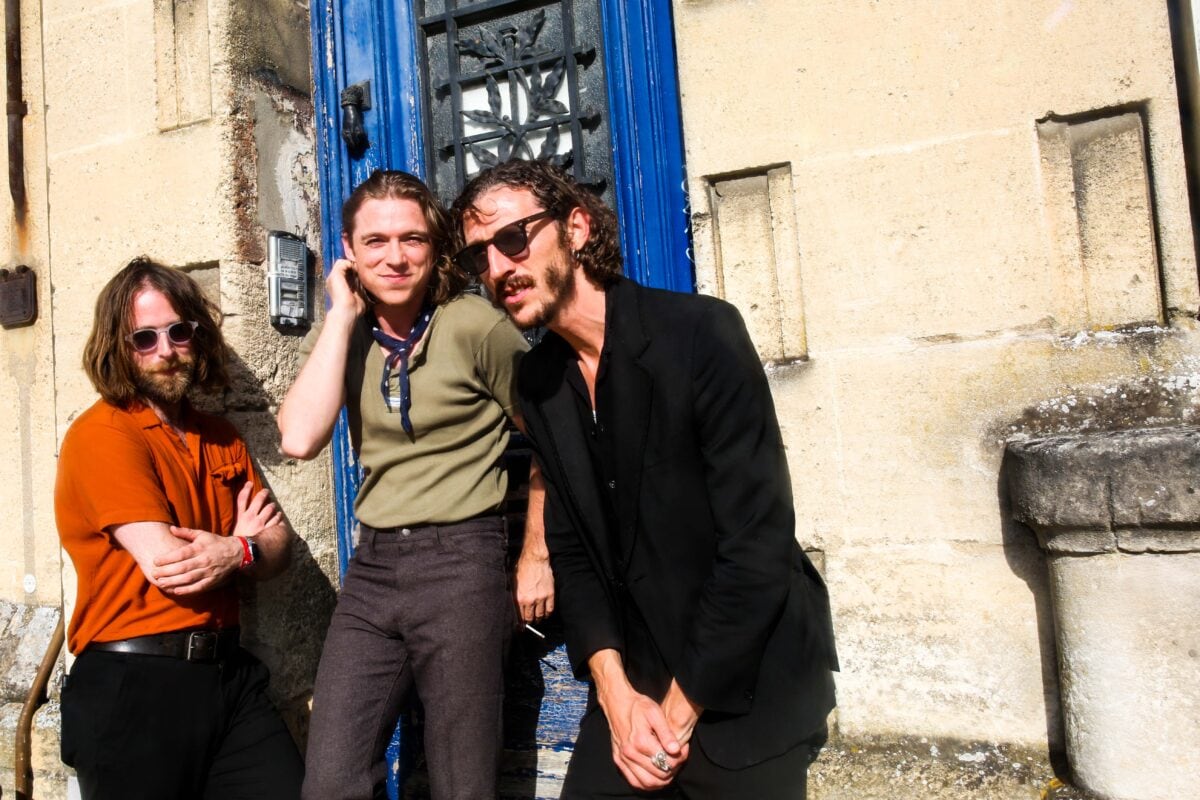
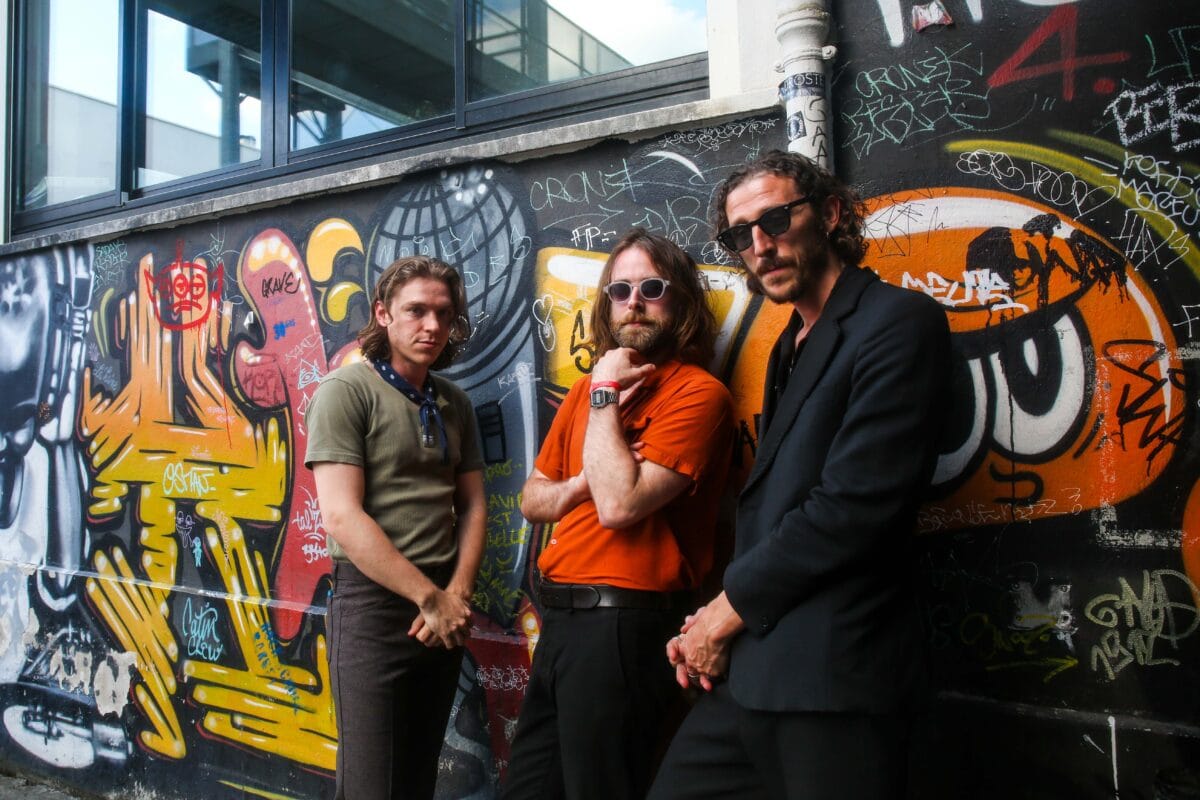
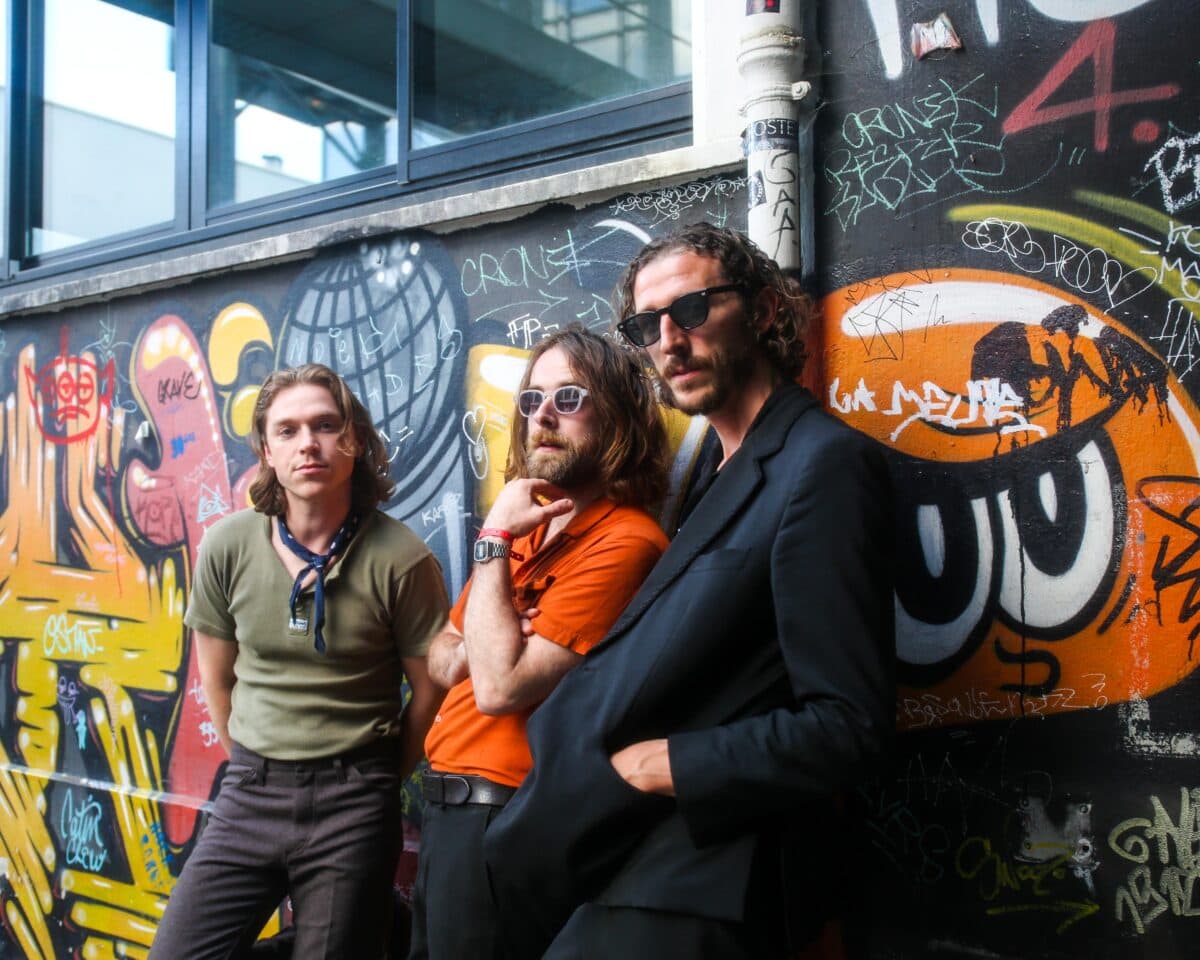
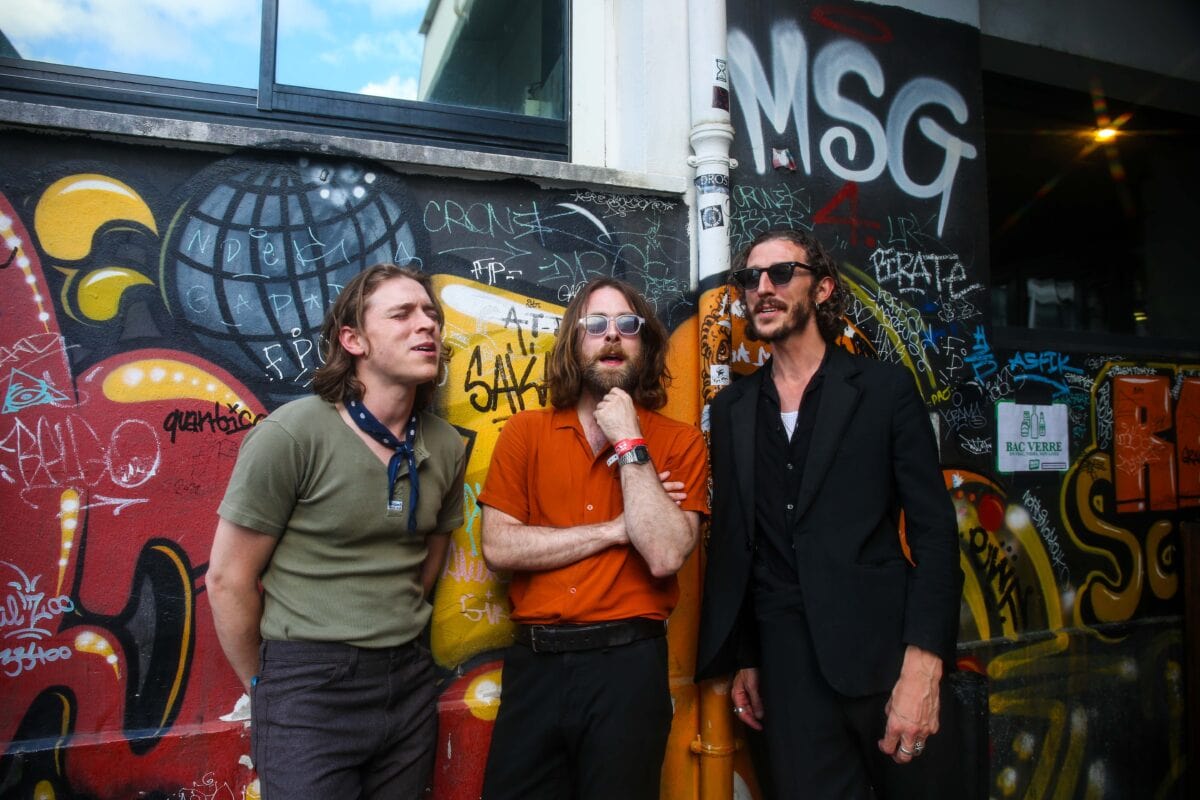
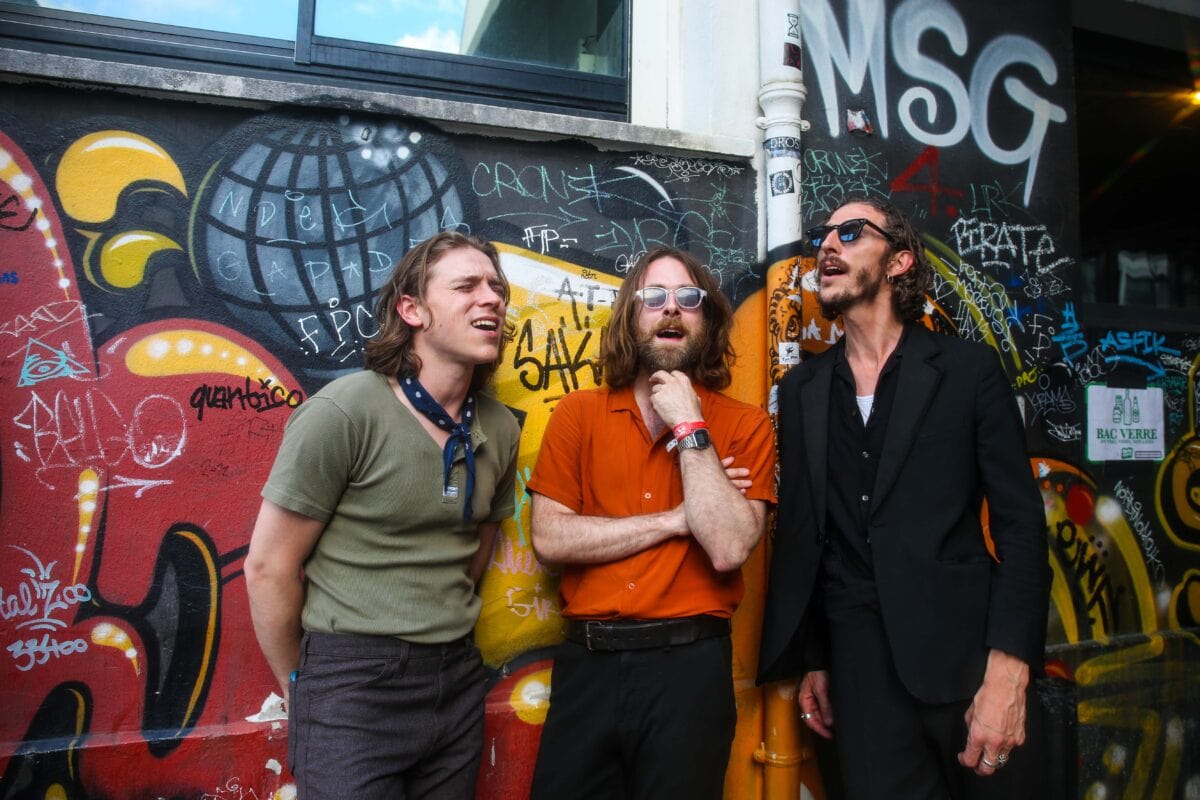
Version en Anglais
La Face B : Hello Demob Happy, Hello guys! The tour is nearly finished. You have only one date left. How did it go?
Matthew Marcantonio: It has been great! It has been amazing! We’ve done two dates in Holland and then five in France and we’ve just been really surprised. Every single show has been amazing.It really feels like we have been touring for a long time but we have never done anything consistently in the Netherlands or France and It feels like a bit of consistency and people are really starting to respond. It is growing in a really cool way. People know the songs and the shows are selling well. It is really amazing.
Thomas Armstrong: we have not been looking at the tickets too much so It is nice to come out on stage and be like “wow you came”
La Face B : Something we discussed with Fraulein is that French people are a lot more interactive when bands are playing. They will say “that’s Ok” if something is happening. No one is here to trick you or bad intentions. It is quite a nice feeling. People are quite enthusiastic with British bands playing here.
Thomas Armstrong: They seem to be supportive of the opening acts as well. They seem to be willing them to succeed. Then they are really loosing their shit when we go on stage, which is what you need to do.
La Face B: Very nice segway! I know you started as the opening acts for Jack White, Royal Blood or Frank Carter.
Matthew Marcantonio: Amongst many
La Face B: I know! So what did you learn from them?
Matthew Marcantonio: Nothing. Nothing at all. We actually taught them a thing or two. They has an education from us.
La Face B: How opening for these bands impacted you.
Matthew Marcantonio: I am joking!
La Face B: I know that – I can see that after two seconds you smile.
Matthew Marcantonio: We learnt loads from them. I think Frank Carter and The Rattlesnakes was the first proper tour we’ve done. Proper established band and we just a lot about how to be a proper band on the road
Adam Godfrey: It was day after day after day and we have never really done it before. We have done shows before but never in front of these crowds and we had to pick up the energy a lot each evening and prepare ourselves a bit more.
Thomas Armstrong: I think it not really what you’ve learnt but you just pick up on touring like little tricks to make things work live like talking gear with people and it is s slightly different thing supporting as well to do headline shows. It is a very different thing. When it is your show, everyone is there and they know the songs and they are waiting for you. When it is the support, you are trying to win over a whole room of people that never heard you. It takes a different energy but it is great when it works.
La Face B: You also have the responsibility to keep up the energy for the main headline and you are discovering a totally new audience, which is brilliant. You can show your sound
Thomas Armstrong: and steal some fans
Matthew Marcantonio: and steal some fans
La Face B: I don’t think it is about stealing fans. It is about being discovered, presenting Demob Happy. The same way when you play at festivals and people discover bands all the time.
Adam Godfrey: We have a lot of people coming to our headline shows we have picked up along the way and stolen from these support shows.
Thomas Armstrong: Sharing maybe
Matthew Marcantonio: Sharing or poached maybe.
La Face B: So you are a trio from Newcastle or Brighton these days? I am quite confused!
Matthew Marcantonio: Newcastle!!!
Thomas Armstrong: Newcastle yeah!
Adam Godfrey: Yeah, Newcastle.
La Face B: Thank you Demob Happy!
Thomas Armstrong: Newcastle born and raised and then left.
La Face B: Left to Brighton. So still not moving to London, still in Brighton.
Matthew Marcantonio: Probably never London.
Thomas Armstrong: Unless we have become stupidly rich and maybe London like a third house in London. I don’t want to be poor in London.
La Face B : It is a bit shit yes. So what do you miss from the North living in Brighton?
Matthew Marcantonio: Well you live in the North (To Thomas)
Thomas Armstrong: I moved back home. So these guys can visit.
Matthew Marcantonio: We are both (with Adam) thinking about moving back to Newcastle soon anyway.
La Face B: Really?
Matthew Marcantonio: Our Brighton saga might be coming to an end.
La Face B: Why Demob Happy?
Matthew Marcantonio: Cos we have been living there for fourteen years!
Thomas Armstrong: It is cheaper and we have family there and It is a really exciting time in Newcastle with lots of great food, great music.
La Face B: I find the North of England very vibrant. I like the North, the creativity, the mindset. People are nice. They are more direct and honest.
Adam Godfrey: We are three honest Geordies.
La Face B: Like Sting.
Thomas Armstrong: Honesty is not appreciated
La Face B: Let’s talk about the evolution of your musical identity! I listened a lot Be Your Man and the rich harmonies. I don’t like to compare but I saw people on Youtube writing “It sounds like the Beatles”
Matthew Marcantonio: It is not a bad thing.
La Face B: I know right? But some people don’t like comparisons because they try to do their own sound. But on your first album, the vocal harmonies are very rich, nostalgic to the Beatles, Beach boys music era. Moving to Divine Machines, your sound is more punchy. It is like the first album was voice harmony-led and the following albums are instrument-rhythm led.
Matthew Marcantonio: It is true.
La Face B: Tell me more about the evolution of your musical identity as Demob Happy!
Matthew Marcantonio: I have never thought about it in those terms. I feel there is less harmonies
La Face B – Be your man is a very esthetic piece in terms of the build up of the voices, the tonalities. It just works and it is very esthetic.
Thomas Armstrong: I don’t think this is something we will ever move away from entirely. The focus has shifted around and obviously the music evolves and changes with us and our tastes with what feel inspired to create. I think the part of being melody and harmony driven is something we always go back to. Maybe it is less celebrated on Divine Machines but there is a luscious sense and a groove we’ve been exploring.
Adam Godfrey: A lot was kind of informed by the making of Divine Machines because you’ve got really involved with adding synths and layers. We were not together writing It as much as we were initially but a lot of the synth starts flowering out.
La Face B: You have a lot of richness. In the first album, It sat with the vocal diversity, in the other albums, it sits with the rhythms like th grove and instruments
Matthew Marcantonio: Pretty spot on really.
La Face B: What inspired you for each album? Or is it just that life happened?
Thomas Armstrong: the first album was almost like the best of the first six or seven years of the band. We picked our favorites songs that we already had from over the years on Eps and small things. And we also went away and worked that into an album and put new stuff in and maybe the latter one It happened in the tightest space of time and far away apart. It’s almost quite organic.
La Face B: How do you write songs? Do you write with 6 hands? Any composition techniques or processes? Do you start with lyrics or melody?
Matthew Marcantonio: It is kind of a spectrum. It is a very song to song basis really. I always end up writing the melody and the lyrics. The lyrics are always last. Like dead last
Thomas Armstrong: Last minute Larry
Matthew Marcantonio: I always find with lyrics, we write the melody and get an idea of phonetic sounds and then once the song is in place It is very much informed by what space there is and what the sound of the melody needs to do to translate the feeling of the moment. I have occasionally on a couple of songs written the lyrics first and then put them into a song but it is normally always like the melody ended up doing this and the harmonies are doing this and there are bits here and there. So I need a bit of lyric there and a bit of lyric there. And that what informs it.
Thomas Armstrong: We dig in after that to for what the song is about. What does it mean to match up what it needs to sound like.
Matthew Marcantonio: There is always an initial idea of the lyric that I will probably improvise for the most part and then be like what I was improvising about? What did I mean and expand upon it? When it comes to finishing the lyrics. It is normally the way it goes, It can be very fun to do it that way but also really exhausting sometimes because you have to get back into that initial feeling of the lyric.
Adam Godfrey: Which is so subconscious to begin with.
Matthew Marcantonio: Exactly and I try to write as many lyrics for the song when inspired in the moment. It is very first inception because it makes the most sense.
La Face B: That’s when the magic happens when it is not too calculated.
Thomas Armstrong: You always think you can write a chorus and a verse and come back and pick it up. But actually, It is not that simple often.
La Face B: This has never evolved during the years? Creative processes can change even if people develop habits really quickly. For you it is melody first and then lyrics.
Matthew Marcantonio: I think so because I have always been so melody driven and as a band we just love melodies. A lot of my favourite artists have written that way as well. Like McCartney, Lennon, they all come up with the melodies first. I always found that if you are tied to a lyrical form it then informs the melody but actually the melody has to be free to do what it needs to do.
La Face B: It is more constraining if you have the lyrics first because you have to fit the music within the lyrics and sound of vowels and the ending of each verse
Matthew Marcantonio: Yeah and it sometimes can be a bit lumpy.
La Face B: The other way around is more fluid and you listen to something and improvise on top of it.
Matthew Marcantonio: Yeah and the lyrics do what they need to do.
La Face B: Matthew, you compose mainly or this is an exercise the three of you are involved
Thomas Armstrong: It is kind of a mix really. Most Demob Happy songs predominantly come from two camps really. Either Matt would have an idea and a song that comes in. Sometimes, it is fully formed, sometimes mostly formed and then we build the band around it and we respond to that idea and put the drums or normally come out of a jam that we’ve had. Sometimes on a soundcheck, or when we go away writing together. A riff or something. Or we take it from the Jam jar and it is a big list of all the cool riffs we have got recorded and stuff we captured from various times. Sometimes when we are together, we just pull something out some that and be like “ what is this going to be?” We work up to a song together. Normally from those camps.
Matthew Marcantonio: It is two camps really. For example, take Be Your Man: That was based on a riff and a chorus I had and I think I had the melodic middle eight. Bringing that in for the lads and then building that up to what It was, or what it is. And the guitar we added. If I am writing by myself, I like being alone and in my own company because I will flash out a thousand ideas and try a million things to see what works, what does not work, try all these cords until I am settled on a thing.
Then, when we are jamming it is a very different thing, It turns in very different emotions and feeling to it. It is always very different because if we are jamming like a cool riff or something, It is a different feeling for me to take that away and write a melody and lyrics over the top. It is reactive as opposed to proactive.
Thomas Armstrong: I could play a groove and Matt would a bass line to that or the other way round. And we kind of do that process of bouncing around stuff. We often move towards something that will make us laugh cause it just sounds crazy or whatever. Our processes fall in those camps. They are different. And also, when you write lyrics especially, There are some times we will say stuff on those jam sessions, we often record those sessions anyway so there might be some bits of melody if you feel inspired or phrases we can build around. For lyrics, it is often good to have closed doors and work out what it means to you. But not so much, what the room of people will be singing. That is killing it, it is too soon.
La Face B: When you are writing songs, some people are very diligent, other don’t think too much but when your song is out there, it is up to the people to feel what they feel.
Thomas Armstrong: You hand over the keys.
Adam Godfrey: You can’t engineer that.
La Face B: You can put so much into it and then It will have a totally different meaning to someone else.
Adam Godfrey: The one time It is thought about is in a dynamic sense like how can this be louder. That’s the part we will consider “well is that gonna fucking pop off?” But it is kind of a later type of decision.
Thomas Armstrong: It is a different hat to think how the song comes across because you have the emotion in there and the craft in there to a point and then you need to put on a hat and say How is that gonna affect people you are mixing it and try to build attention release and stuff
La Face B: To have a reaction. It is super important how people sing along. Bands like Queen would do chorus that are made to encourage people to sing, clap and it is the vibe you want to give your song not the meaning. When it is out there, it does not belong to you anymore. So, after this tour, what is happening Demob Happy?
Thomas Armstrong: I don’t think we have announced anything. There are things.
Matthew Marcantonio: There is the odd thing happening here and there. We are about to announce a show in Holland, in Utrecht. There is a festival in Germany, one in Belgium so we are doing bits and bobs.
La Face B: Any new album for Demob Happy?
Matthew Marcantonio: We are gonna work in a new record basically.
La Face B: Did the tour inspire new material?
Matthew Marcantonio: Not yet.
Thomas Armstrong: We wrote a song in rehearsals where we should have been practicing. That was pretty great. We loved, it made us laugh.
Matthew Marcantonio: It looks we will work on that towards the end of the year.
La Face B: Thank you very much Demob Happy. I wish you a great show in Barbey tonight and Lille.
Demob Happy: Thank you!
